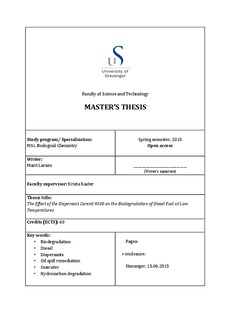| dc.contributor.author | Larsen, Marit | |
| dc.date.accessioned | 2015-09-17T06:54:00Z | |
| dc.date.available | 2015-09-17T06:54:00Z | |
| dc.date.issued | 2015-06-15 | |
| dc.identifier.uri | http://hdl.handle.net/11250/300349 | |
| dc.description | Master's thesis in Biological chemistry | nb_NO |
| dc.description.abstract | Crude oil and different petroleum products are marine polluters and have become an important environmental issue in the last century. Hydrocarbons are inherently present in the oceans due to natural seeps, but the main source of petroleum pollution is anthropogenic sources. Biodegradation is an important process in oil spill remediation, and several chemical dispersants have been developed to aid the degradation process by rapidly dispersing the oil to increase its bioavailability. This study was performed to investigate the effect of the dispersant Corexit 9500 on biodegradation of diesel at low temperatures. Chemical and microbiological methods were used to analyse the biodegradation process at 3, 8 and 15°C over 60 days. Biological oxygen demand (BOD) analysis indicated an increase in the growth rates of the microbial community with increasing temperature and in the presence of Corexit 9500, while a total hydrocarbon analysis using GC-FID revealed that the amount of diesel degraded was independent of temperature and ultimately unaffected by the presence of Corexit 9500. Corexit did not affect the biodegradation of diesel at colder temperatures. Corexit itself was also biodegraded seemingly independent of temperature. Molecular analysis by denaturing gradient gel electrophoresis (DGGE) revealed changes in the intrinsic microbial community in the presence of Corexit 9500 and diesel, where the communities adapted depending on the substrate available. The microbial community was enumerated using Bushnell-Haas plates with Arabian crude oil, and due to large variations in the counts the method must be improved for more consistent and reliable results. Further research is recommended to better understand the effect of chemical dispersants on biodegradation at low temperatures to develop suitable methods for hydrocarbon pollution remediation. In addition, it is recommended to focus on improving methods for cultivation of hydrocarbon degraders. | nb_NO |
| dc.language.iso | eng | nb_NO |
| dc.publisher | University of Stavanger, Norway | nb_NO |
| dc.relation.ispartofseries | Masteroppgave/UIS-TN-IMN/2015; | |
| dc.rights | Navngivelse 3.0 Norge | * |
| dc.rights.uri | http://creativecommons.org/licenses/by/3.0/no/ | * |
| dc.subject | biodegradation | nb_NO |
| dc.subject | diesel | nb_NO |
| dc.subject | dispersants | nb_NO |
| dc.subject | oil spill remediation | nb_NO |
| dc.subject | seawater | nb_NO |
| dc.subject | hydrocarbon degradation | nb_NO |
| dc.subject | biologisk kjemi | nb_NO |
| dc.title | The effect of the dispersant Corexit 9500 on the biodegradation of diesel fuel at low temperatures | nb_NO |
| dc.type | Master thesis | nb_NO |
| dc.subject.nsi | VDP::Mathematics and natural science: 400::Basic biosciences: 470::Biochemistry: 476 | nb_NO |

